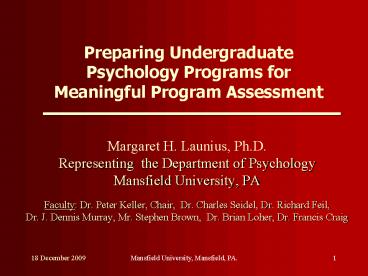Preparing Undergraduate Psychology Programs for Meaningful Program Assessment - PowerPoint PPT Presentation
1 / 16
Title:
Preparing Undergraduate Psychology Programs for Meaningful Program Assessment
Description:
Extended time for discussion. Regular department meetings, faculty retreats ... Investigating educational & employment interests. Goal planning/assessment ... – PowerPoint PPT presentation
Number of Views:46
Avg rating:3.0/5.0
Title: Preparing Undergraduate Psychology Programs for Meaningful Program Assessment
1
Preparing Undergraduate Psychology Programs for
Meaningful Program Assessment
- Margaret H. Launius, Ph.D.
- Representing the Department of Psychology
- Mansfield University, PA
- Faculty Dr. Peter Keller, Chair, Dr. Charles
Seidel, Dr. Richard Feil, - Dr. J. Dennis Murray, Mr. Stephen Brown, Dr.
Brian Loher, Dr. Francis Craig
2
The Initial Phase Assessing Your Challenges
- Assess institutional support
- Is program assessment part of the institutional
mission? - Are resources available to support faculty
efforts in planning program evaluation? - Assess faculty support
- Are most of the faculty willing to engage in
meaningful dialogues about assessment? - Are at least some of the faculty willing to
engage in the process with enthusiasm?
3
The Initial PhaseCreating a Positive Climate
- Planning requires
- Extended time for discussion
- Regular department meetings, faculty retreats
- Workshops, conferences, consultations
- Teamwork is key
- Collegial collaboration
- Candor and acceptance
- Recognition and support of efforts
4
The Working PhaseDevelop a Plan
- Create a mission statement
- What makes your program special?
- Select learning outcomes
- Start with the basics
- Select demonstration methods
- Use quantitative and qualitative methods
- Link outcomes to courses
- Integrate outcomes into courses activities
5
The Assessment Phase Evaluating the Program
- Collecting
- Determine how you will collect the data
- Evaluating
- Determine how you will evaluate the data
- Utilizing
- Determine how you will utilize the results
- Assessing
- Assess and refine program assessment activities
6
Program Evaluation Resources
- American Psychological Association
- Conducting a Program Review
- http//www.apa.org/ed/pcue/reviewpgm.html
- Assessment CyberGuide
- http//www.apa.org/ed/guidehomepage.html
- American Association of Higher Education
- Assessment Forum
- http//www.aahe.org/initiatives/assessment.htm
- 9 Principles for Assessing Student Learning
- http//www.apa.org/ed/aahe_principle.html
7
From Ignition to Liftoff A Model for
Undergraduate Psychology Program Assessment
- Margaret H. Launius, Ph.D.
- Representing the Department of Psychology
- Mansfield University, PA
- Faculty Dr. Peter Keller, Chair, Dr. Charles
Seidel, Dr. Richard Feil, - Dr. J. Dennis Murray, Mr. Stephen Brown, Dr.
Brian Loher, Dr. Francis Craig
8
Mansfield Psychology Department
- A small, comprehensive, rural university in
northern Pennsylvania - 180 psychology majors
- 80 in a psychology track
- 20 in a human resource management track
- 8 full-time faculty
- A commitment to planning collaboration
9
Ignition to Liftoff Program Characteristics
- Focus on Student Learning
- Operationally defined learning outcomes
- Integrated throughout the curriculum
- Active Advising
- Help students remain focused on program outcomes,
their learning, and professional goals - Continuous Faculty Efforts
- Keep each other on track with the process
- Assess program effectiveness
10
Ignition to Liftoff Curriculum Characteristics
- Ignition - A First Year Seminar course
- Orientation to programs mission, goals,
student learning outcomes - Orientation to discipline of psychology
- Introduction of portfolio
- Liftoff - A Senior Seminar capstone course
- Preparing for life after the program
- Other outcomes assessment completed
- Complete and submit psychology portfolio
11
The Ignition Liftoff Connection
Focusing on Success After Degree
Initial Experiences in the Program
- First Year Seminar
- Exploration of career options w/ psychology
degree - Goal planning
- Course planning
- Beginning skills assessment
- Ethics introduction
- Presentation in class
- Community service/citizenship
- Portfolio initiation
- Senior Seminar
- Investigating educational employment interests
- Goal planning/assessment
- Job skills/preferences assessment
- General knowledge examination
- Learning ethical analysis
- Presentation to MU community
- Community service/citizenship
- Portfolio completion/submission
12
The Mansfield Portfolio in Context
PSY 1101 Intro to Psy
PSY 1151 First Year Seminar
Core Requirements of Psychology Major
Courses identify outcomes projects suitable for
portfolio
Portfolio submissionExit examinationPublic
presentations
PSY 4490, Senior Seminar
Assessment of Outcomesand Program Revision
Sample of portfolios evaluatedResults reviewed
at retreatProgram changes considered
13
Assessing Student Portfolios
- Gathering the data
- Collection, sampling, and storage
- Reviewing the portfolios
- Using a committee approach
- Assessing the outcomes
- Reviewers checklist
- Analyzing the reviewers ratings
- Quantitative qualitative
14
Utilizing Our Assessment Results
- Clarifying expectations of each other and our
students - Improving consistency in APA style
- Identifying program areas not covered
sufficiently - Ethics, diversity, research methods
- Curricular Changes
- Adding introduction to research methods course
15
Summary The Assessment Loop
- Define the programs mission, goals, learning
outcomes - Collect the data and artifacts
- Analyze and interpret the data
- Utilize the findings to enhance the program
16
For More Information Contact
- Margaret H. Launius, Ph.D.
- Mansfield University
- Mansfield, PA 16933
- mlaunius_at_mansfield.edu
- or visit http//www.mansfield.edu/psycholo/MainPa
ges/BPAHandouts.html































